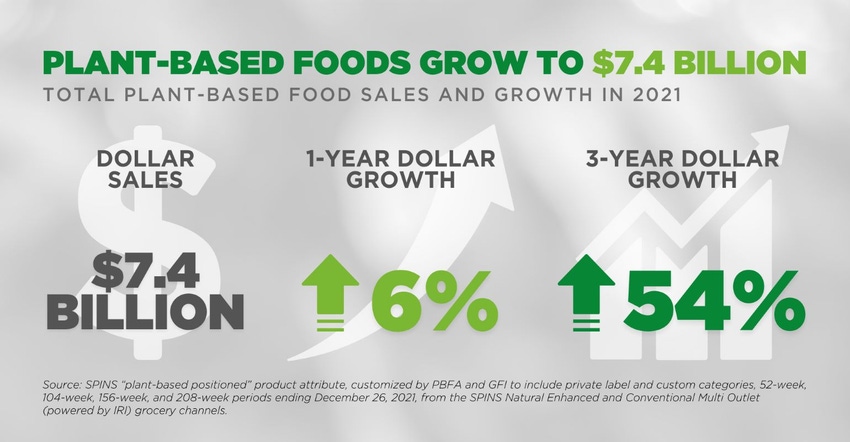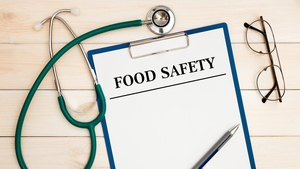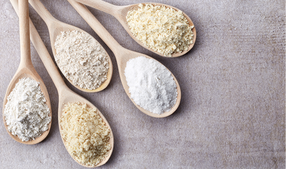U.S. retail sales of plant-based food and beverages grew 6.2% in 2021 to reach a record high of $7.4 billion, according to new data from the Plant Based Foods Association (PBFA).

The data released March 24 by PBFA, The Good Food Institute (GFI) and SPINS found despite turbulent economic conditions amplified by the pandemic, supply chain issues and inflation, plant-based food and beverage sales grew three times faster than total food retail sales, with most plant-based categories outpacing their conventional counterparts. Further, sales of plant-based food and beverages have increased 54% in the past three years.
“The sustained rise in the market share of plant-based foods is remarkable and makes it clear that this shift is here to stay,” said Julie Emmett, PBFA senior director of marketplace development. “More and more consumers are turning to plant-based options that align with their values and desire to have a positive impact on personal and planetary health.”
Plant-based milk growth continues to drive category
Plant-based milk sales grew 4% to $2.6 billion in 2021, while sales of animal-based milk sales declined 2%. According to the report, plant-based milk sales growth added $105 million to the market, while conventional milk sales declined $264 million. Plant-based milk now accounts for 16% of the milk category’s dollar sales and 20% of the category’s dollar growth in the past three years.
Over three years, plant-based milk sales increased 33%. In the Natural Enhanced Channel, plant-based milk represents 40% of all milk sold, up from 34% in 2018. Forty-two percent of households purchase plant-based milk, and 76% of plant-based milk buyers purchased it multiple times in 2021.
Almond milk remains the category leader and accounts for 59% of the total category. Oat milk is the second-largest segment, growing more than 44 times in the past three years, now making up 17% of category sales, up from only 0.5% in 2018. Plant-based milk now serves as the innovation leader in the milk category, supported by key advancements in ingredient diversification and product development to improve taste, functionality and nutrition.
Plant-based dairy poised for innovation
The success of plant-based milk has laid the groundwork for major increases in sales of other plant-based dairy products, which reached $2.1 billion in total sales in 2021. Categories like ready-to-drink (RTD) beverages, and plant-based creamers—which now has a 9% share of all creamers sold— experienced rapid growth.
Across the store, plant-based dairy sales are growing faster than those of many conventional animal products. In 2021, plant-based yogurt sales grew 9%, three times the rate of conventional yogurt; plant-based cheese sales grew 7%, while conventional cheese sales declined 2%; and plant-based ice cream and frozen desserts grew 31% over the past two years to reach $458 million. In the Natural Enhanced Channel, dollar share of plant-based creamers grew to 33% of all creamers sold, while plant-based yogurt grew to a 21% share of all yogurts.
Plant-based meat laps a record year
Plant -based meat—the second-largest plant-based category—remained strong at $1.4 billion in 2021, with sales growing 74% in the past three years, outpacing conventional meat sales by almost three times.
In 2021, plant-based meat’s dollar share was 2.7% of retail packaged meat sales, or 1.4% of the total meat category. Each of these plant-based meat share numbers increased 19% over the last two years. What’s more, 19% of households purchased plant-based meat in 2021, up from 18% in 2020, with 64% of buyers purchasing plant-based meat more than once throughout the year.
Plant-based burgers continue to lead the plant-based meat category as the top-selling product type. The fastest-growing plant-based meat product types in 2021 were plant-based meatballs, chicken nuggets, tenders and cutlets, and deli slices. Plant-based chicken was a growth leader in 2021 as more products that match the taste, texture and appearance of animal-based chicken hit retail shelves. There remains a significant ongoing opportunity in plant-based seafood, which grew 14% to $14 million, but accounts for just 1% of the plant-based meat market, compared to conventional seafood composing a fifth of total meat and seafood sales.
Sales of conventional meat increased three times faster than unit sales, indicating the growth in that category is driven by price increases as supply chain disruptions continue. IRI's inflation index shows conventional retail meat prices were 13% higher in March 2022 than in March 2021.
Plant-based eggs continue rapid growth
The plant-based egg category also grew rapidly in 2021 with a 42% increase in sales. In the past three years, plant-based egg sales have grown more than 1,000%. And with conventional egg sales declining by 4% in 2021, plant-based eggs have grown to earn a nearly 0.6% share of the total egg market, compared to a 0.05% share three years ago.
Plant-based consumers wield purchasing power
According to the data, 62% of U.S. households are now buying plant-based products, up from 61% in 2020. Increased repeat rates in plant-based foods across numerous record-breaking years illustrate strong consumer commitment and interest—the percentage of consumers purchasing multiple times within the plant-based category grew from 78% in 2020 to 79% in 2021.
Millennials and Gen Z, which compose 47% of the population and will continue to grow in their spending power, have particularly high demand for plant-based foods. These generations are also increasing their ecommerce spending the most—and ecommerce sales of total plant-based foods grew 47% in the last year to $351 million, up from $240 million in 2020. Consumers, particularly Millennials and Gen Z, are motivated by an interest in foods that are better for their health and deliver on positive environmental impact and social responsibility.
About the Author(s)
You May Also Like






